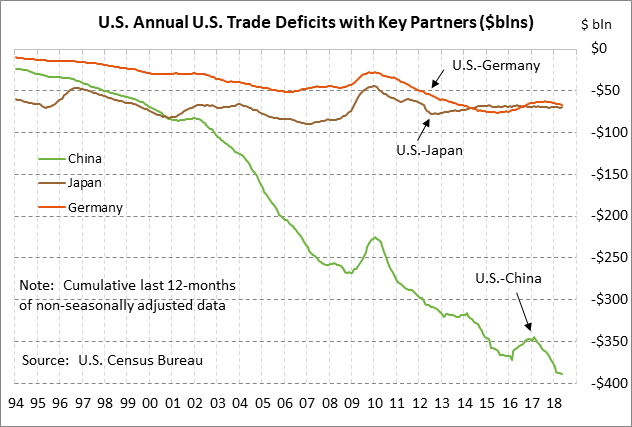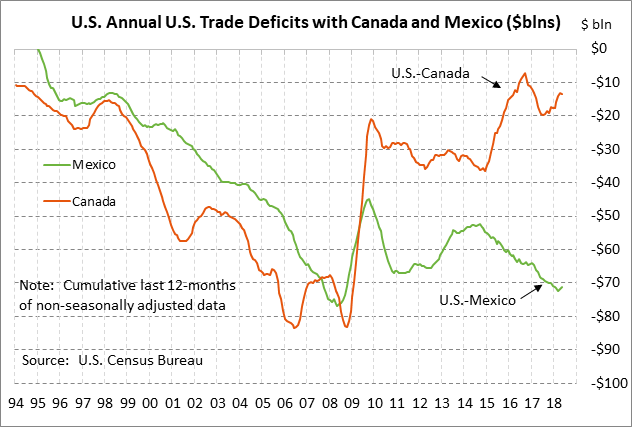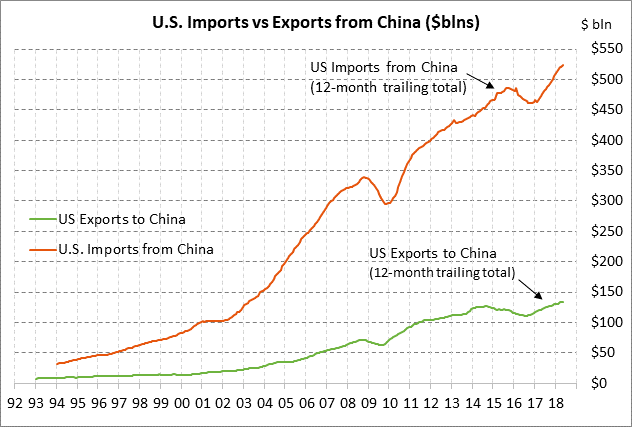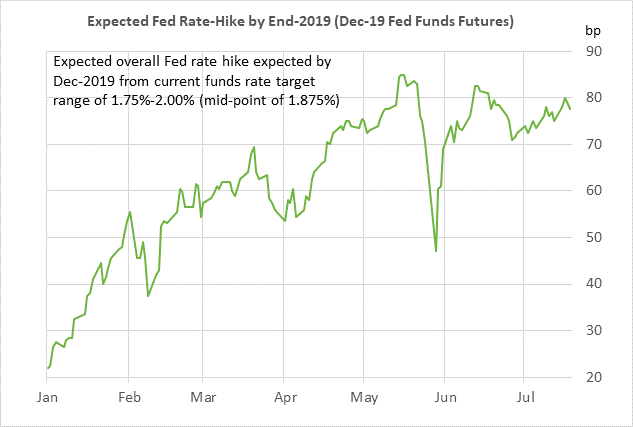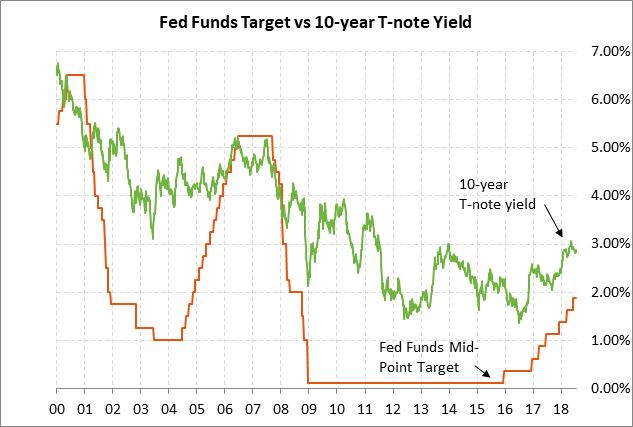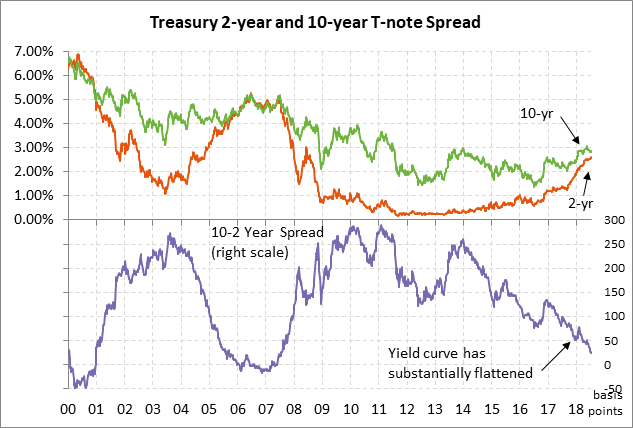- Next week’s US/EU meeting on auto tariffs poses market risks
- Fed may accelerate rate hikes in response to President Trump’s criticism of higher interest rates
Next week’s US/EU meeting on auto tariffs poses market risks — European Commission President Jean-Claude Juncker is scheduled to meet next Wednesday in Washington with President Trump with the key topic being auto tariffs. There is some downside risk for the markets if the meeting goes poorly, which is a distinct possibility.
President Trump has already launched a trade investigation on national security grounds with the idea of slapping a 25% tariff on all U.S. auto imports or at least a 20% tariff on auto imports from Europe. Mr. Juncker next week is expected to offer some negotiating ideas on how to avert those tariffs.
The drive for a compromise is coming mainly from Germany, which would take a heavy hit if the U.S. slaps a 20% tariff on German auto exports to the U.S. By contrast, France reportedly does not want to negotiate because of its view that if Europe shows weakness on autos, the Trump administration will simply move on to make demands in even more important sectors such as agriculture. France reportedly sees U.S. tariffs on European autos as inevitable and simply wants to retaliate.
France also reportedly sees the Trump administration’s demand on autos as an attempt to drive a wedge between France and Germany and cause internal strife within the EU. France therefore believes that the EU should stand together as a group and should retaliate in kind. Indeed, there were various reports on Wednesday that the EU is already compiling a new list of U.S. products that will be subject to a retaliatory tariff if the Trump administration goes ahead with a tariff on European autos.
The U.S. imported about 60 billion euros worth of cars and car parts in 2017, which indicates that the impact of a U.S. tariff on European autos would be significant. U.S. tariffs on all auto imports would have a major impact on U.S. consumers and businesses since the U.S. in 2017 imported about $360 billion worth of autos, trucks, and parts.
We view the odds as slim for a US/EU deal to avert auto tariffs since only Germany is pushing for a deal and since there are limited options about how to structure a deal. The U.S. cannot simply strike an agreement with Germany on autos and call it a day since the U.S. has to deal with the EU as a whole. In addition, there are only a few ways to structure a deal such as (1) a cut in U.S. and EU tariffs on autos that would then apply to all WTO members, (2) an auto tariff deal that is part of a larger US/EU free trade agreement that covers at least 90% of their total trade, or (3) a multiplural deal on auto tariffs that is reached globally among all major auto exporters and importers. Trump administration would likely balk at all those options.
The bottom line is that the odds are high in our view for a U.S. tariff on U.S. auto imports. There is no specified time frame for how long the Commerce Department will take for its investigation into whether auto imports present a national security threat. However, the investigation may not take long if the outcome is predestined. In our view, the markets need to be prepared for a U.S. auto tariff announcement soon.
Meanwhile, Japan’s trade minister yesterday hinted that the U.S. can expect Japanese retaliation if the U.S. slaps a tariff on Japanese vehicles. Japan did not retaliate against the U.S. steel and aluminum tariffs, but Japan’s trade minister said the U.S. can expect a stronger response to auto tariffs.
Fed may accelerate rate hikes in response to President Trump’s criticism of higher interest rates — The odds for the Fed’s fourth rate hike of the year in December may have actually increased after President Trump yesterday said in a CNBC interview that he is not happy about the Fed’s rate-hike policy. Mr. Trump softened his incursion into the Fed’s normally-independent realm by adding that “But at the same time I’m letting them do what they feel is best.”
The dollar fell sharply by -0.5% after Mr. Trump made his comment due to its negative implications for the dollar’s interest rate differentials. Treasury yields fell by 1-2 bp on the comment.
It is possible that Mr. Trump’s comment was just a one-off statement that will have no lasting impact. However, it is also possible that the comment could mark the beginning of a sustained campaign by Mr. Trump against the Fed to discourage further interest rate hikes, much like Mr. Trump has been persistently criticizing OPEC for high gasoline prices. In that case, the Fed might bend to the political pressure and pull its punches on raising interest rates, which is why the markets reacted dovishly to yesterday’s comment.
However, we believe that pressure from Mr. Trump could instead encourage the Fed to get its rate hikes out of the way as soon as possible to avoid a multi-year attack from Mr. Trump. For that reason, we suspect that Mr. Trump’s comments actually increased the odds for the fourth rate hike of the year in December, although the Fed next year may start pulling its punches if Mr. Trump’s pressure continues.
If the Fed in fact conducts its third rate hike of the year in September and its fourth rate hike in December, then the Fed will have the funds rate target at 2.25-2.50%. At that level, the Fed will have at least pushed the funds rate into positive inflation-adjusted territory above the current expected inflation rate of about +2.1%. The Fed at that point would then have more flexibility to slow its rate hikes to adjust to the economy and possibly the political climate.

